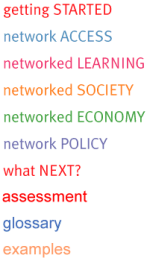|
|||
Without an educated, ICT-savvy populace, no community can fully participate in the Networked World. To foster this resource, information and communication technologies must be incorporated into the learning system. Lamentably, although the use of ICTs in education is one of the most powerful catalysts to Networked Readiness, it is an opportunity that is often squandered, misunderstood or underestimated. Schools' Access to Information and Communication Technologies. Schools must integrate ICT tools into their learning processes if they are to be part of the Networked World. Programs that give students access to information and communication technologies in the classroom provide an important step to improving Readiness. A school's Readiness in terms of access can be broken down into six broad areas: number of computers, physical access to the technology, types of computers, diffusion of the network, access to and organization of electronic content, and quality and speed of connectivity in the school. In general, the diffusion of information and communication technologies is driven by unit cost per pupil. Computers tend to be adopted first at the university level, then by the secondary school system, and finally by primary schools.
Enhancing Education with
ICTs. While putting
ICTs into schools is an important first step to Readiness, the
technologies need to be properly harnessed to improve the learning
process. Teachers must be trained to use the Internet and computers as
tools for the students' benefit; this training is central to Readiness.
Curricula must be redesigned to encourage the use of ICTs in the pursuit
of problem solving, group learning and research. Students should be taught
from the earliest age possible to use information and communication
technologies to enhance and improve their learning experiences. Full
integration of ICTs into the learning process is optimal, and
collaborative, project-based learning can make up a solid pedagogical
strategy for ICT-enhanced education. Developing the ICT Workforce. It is essential that there exist opportunities within the community to offer future ICT workers both first-time and continuing training in essential skills such as software programming, hardware engineering and World Wide Web design. These opportunities are fundamental to creating a sustainable ICT industry and support the integration of ICTs into the local economy. |
|||



